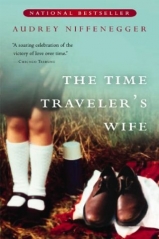 After countless raves and recommendations from all sides, I finally finished this book on the plane home. I’m generally more critical about things that come highly recommended, so take the following with a grain of salt.
After countless raves and recommendations from all sides, I finally finished this book on the plane home. I’m generally more critical about things that come highly recommended, so take the following with a grain of salt.
First, the plot is entertaining and not at all difficult to get through. The author handles time travel — a fairly complex and overused plot device– freshly and elegantly, so the whole suspension of disbelief thing is not really an issue there. The writing style is sometimes too ponderous and melodramatic, but overall it’s fairly well done, classically contemporary. I like how the story unfolds in a sequence of intertwining vignettes — it plays well to my preferred organisation of life as a series of vivid, colorful, mood-moments. So far, so good.
A lot of people I know love this book because they love the central relationship in it. They want to be Henry, or Clare, or to have some shadow of what they have together. It’s not hard to see why. Henry is clearly a character tailored to appeal to female fantasies, and Clare, well, she is what girls think guys want (but who knows if it’s actually true) — fiery, beautiful, pure, and devotedly willing to wait. But is the fact that they are romantic archetypes enough to warrant their undying devotion to each other? It didn’t completely work for me.
If their relationship is deterministic and ethereal, transcending space and time, then why does it all manifest as so purely physical when they are together? Seriously, whenever Henry is not time-traveling, they are basically just sleeping together. Or just literally sleeping. The story wants so badly for you to envy and see hope in how their closeness transcends adversity , but I only felt depressed by it. The world around them seems so sparse and monotone (sorry Tina, but the fact that it’s Michigan makes it worse, I think), and their relationship isn’t quite three-dimensional enough to suck you in and compensate.
Maybe it’s because I’m no longer under the impression that love needs to be tragic to be beautiful (what a change from myself in middle-school, finishing Pullman’s His Dark Materials trilogy for the first time…or my past obsessions with all the monologues in Romeo and Juliet. I would have loved everything about this novel five years ago.). I wanted Henry and Clare to have a little more fun together, to create a more believable sadness when they are apart. I wanted them to grow and change over time, but they were disappointingly static. The letter that Henry writes at the end was my favorite part, but I feel like perhaps the story would have been better if he had not told Clare, so that her life could be unencumbered for awhile instead of more of the same. The final scene would have been just as poignant and joyous, or even more so.
But overall, worth reading for the circular plot (really very well managed), and before the movie comes out. If you do read it, let me know what you think!
Next up..some Murakami this summer.


4 comments
Comments feed for this article
May 30, 2009 at 4:23 pm
tinajro
crystal! i liked the story because i think the best parts are when they are just in their own time….doing normal things…
that’s the beauty of it. its not he fiery passion…but the monotony of it
and michigan is wonderful (although i did not catch that it was placed in michigan…)
May 31, 2009 at 6:40 pm
Danielle
I loved this book when I read it last summer, but I do see your point. Their relationship seems very much like Clare imprinted on Harry early on and then they were inseparable. The true joy of this story is in the expertly intricate circular storytelling. Somehow the normal problems I have with time travel stories (as much as I may enjoy them) seemed diminished in the way the book was presented.
June 3, 2009 at 4:23 pm
tiffy
i think this book also speaks much more powerfully if you’re currently in the midst of a tumultuous long-distance relationship -___-
mmm as for murakami…the wind-up bird chronicle 🙂
June 3, 2009 at 10:07 pm
courtney
i actually kind of agree with you…i enjoyed it, but not as much as i could have =)